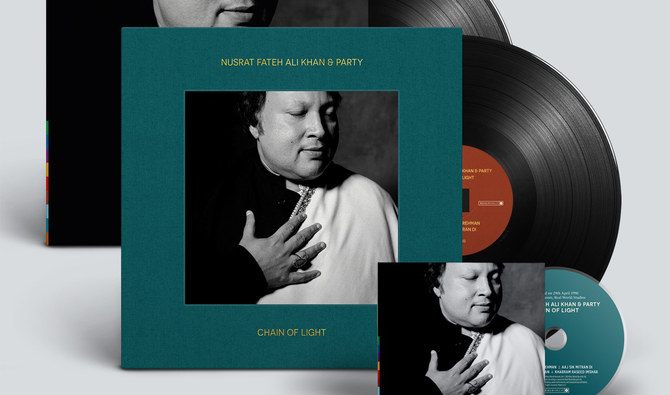ISLAMABAD: A new album of unheard melodies by Pakistan’s music icon Nusrat Fateh Ali Khan, recorded 34 years ago, will be released on September 20, according to a statement from Real World Records issued on Wednesday.
Founded in 1989 by Peter Gabriel, the company recorded Khan’s fusion music, which blends the mystical qawwali style of the East with Western instruments and sensibilities, following a collaborative decision between the two musicians.
The Pakistani maestro’s lost album — named ‘Chain of Light’ — was discovered in the Real World Records’ tape archives.
It was produced after the label signed him in 1989 and released a series of universally acclaimed albums with him throughout the 1990s.
“I’ve had the privilege to work with a ton of different musicians from all over the world in my time, but perhaps the greatest singer of them all was Nusrat Fateh Ali Khan,” Peter Gabriel said in a statement released by the company.
“What he could do and make you feel with his voice was quite extraordinary and we were very proud to have played a role in getting him to a much wider global audience,” he added. “It was a real delight when we found out this tape had been in our library. This album really shows him at his peak. It’s a wonderful record.”
Buried deep in a warehouse storage space, the label unearthed the album while relocating its archive in 2021.
Khan tragically passed away in 1997 at the age of 48. Almost 30 years later, however, his legacy continues to attract new generations of fans, evident in the six million average monthly Spotify listeners and YouTube videos of his music racking up over 1 billion views.
Reflecting on the album’s significance, producer Michael Brook, who collaborated with Khan on the popular “Mustt Mustt” album, noted that the Pakistani singer’s voice profoundly touched listeners.
“It is a once in a lifetime experience,” he said. “Like the immanent light of the record’s title, these songs are transformative and transcendent in a way that crosses languages and cultures. It draws the listener in, no matter their expectations.”
He said he was happy that Khan’s voice had returned.

















